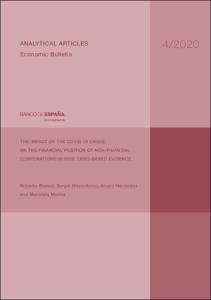Registro completo de metadatos
| Campo DC | Valor |
|---|---|
| dc.contributor.author | Blanco, Roberto |
| dc.contributor.author | Mayordomo, Sergio |
| dc.contributor.author | Menéndez Pujadas, Álvaro |
| dc.contributor.author | Mulino, Maristela |
| dc.coverage.spatial | España |
| dc.date.accessioned | 2020-12-04T20:13:06Z |
| dc.date.available | 2020-12-04T20:13:06Z |
| dc.date.issued | 2020-12-01 |
| dc.identifier.uri | https://repositorio.bde.es/handle/123456789/14281 |
| dc.description | Artículo de revista |
| dc.description.abstract | The first part of this article describes developments in the profitability, solvency and liquidity of Spanish non-financial corporations, drawing on the integrated CBSO database, which contains annual information up to 2019. This analysis evidences that, at end-2019, the corporate sector was in a relatively strong position to withstand an adverse shock. This was, however, compatible with the existence of segments that were in a more vulnerable position. It then analyses the impact of the COVID-19 crisis on the firms’ financial position, on the basis of Central Balance Sheet Data Office Quarterly Survey data for the first three quarters of 2020, which include a relatively small number of generally large firms. The COVID-19 crisis has triggered steep drops in ordinary earnings, employment and profitability levels in this sample of firms. In addition, extraordinary gains and losses have performed very negatively. This has led this group of firms to record a net loss in the Central Balance Sheet Data Office Quarterly Survey for the first time since 2002. The financial position of these firms has also deteriorated in 2020. The average debt ratios and the average debt burden ratio have risen, caused by both higher corporate debt and, to a greater degree, lower ordinary earnings. However, the firms have increased their liquidity buffers as a precautionary measure. The article also includes two boxes. Respectively, these analyse the impact of the COVID-19 crisis on the profitability and the solvency of the corporate sector in 2020, on the basis of various microsimulations. The findings of Box 1 show that the decline in profitability appears to have been particularly steep in the SME segment and, especially, in the sectors hardest hit by the crisis. Box 2 evidences that the crisis seems to have prompted a sharp rise in the financial pressure borne by the firms, in addition to undermining, albeit more moderately, their solvency. |
| dc.format.extent | 22 p. |
| dc.language.iso | en |
| dc.publisher | Banco de España |
| dc.relation.ispartof | Economic Bulletin / Banco de España, 4/2020 |
| dc.relation.hasversion | Versión en español 123456789/14241 |
| dc.rights | Reconocimiento-NoComercial-CompartirIgual 4.0 Internacional (CC BY-NC-SA 4.0) |
| dc.rights | In Copyright - Non Commercial Use Permitted |
| dc.rights.uri | https://creativecommons.org/licenses/by-nc-sa/4.0/deed.es_ES |
| dc.rights.uri | http://rightsstatements.org/vocab/InC-NC/1.0/ |
| dc.subject | Activity |
| dc.subject | Earnings |
| dc.subject | Financial position |
| dc.subject | Non-financial corporations |
| dc.subject | COVID-19 |
| dc.subject | Economic situation |
| dc.subject | Financial analysis |
| dc.title | The impact of the Covid-19 crisis on the financial position of non-financial corporations in 2020: CBSO-based evidence |
| dc.type | Artículo |
| dc.identifier.bdebib | 000470620 |
| dc.identifier.bdepub | ECBU-2020-4B-art39 |
| dc.subject.bde | Estudios industriales |
| dc.subject.bde | Economía de la empresa |
| dc.subject.bde | Financiación de la empresa |
| dc.publisher.bde | Madrid : Banco de España, 2020 |
| dc.subject.jel | L25 |
| dc.subject.jel | M21 |
| dc.subject.jel | M41 |












